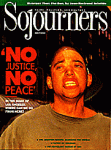Rev. James Lawson was pastor of Holman United Methodist Church in Los Angeles when this article appeared. He was a primary trainer for many nonviolence movements, most notably the Southern Christian Leadership Conference in the 1960s. Lawson was interviewed by telephone by Joe Nangle, O.F.M.
- The Editors
Sojourners: As a pastor, how is the Bible relevant to your recent experiences in Los Angeles?
James Lawson: I feel that in the fires in LA, God is offering the community of faith another burning bush experience. In Exodus the burning bush caught hold of Moses' attention so that Moses could hear God saying that it is the world that sets God's agenda. Chapter 3 is very clear: I have witnessed the misery of my people; I have heard them crying out because of their oppressors; I know what they are suffering; and I have come to rescue them out of the hands of the Egyptians, to bring them out of that country and into a new land that flows with milk and honey.
The fires of LA are the fires of frustration and pain and misery and oppression. They are an indication of the frustration of millions of people who cut across the lines of class and color, if we want to hear it.
But the "Egyptians" do not want to acknowledge this. Pharaoh wants to pretend that it's the looting and killing that's immoral and that law and order must prevail. The burning bush offers people of faith and people across the nation a different look, an opportunity to stop and hear what is going on among all people.
Excessive force is violence; racism is violence; economic exploitation is violence. And they all perpetrate the myth of--"we and they"--the myth of racism.
Sojourners: You have a long record of nonviolence. In the rebellion in LA, did you see a spark of resistance, of hope?
Lawson: In some nonviolent thinking, the notion exists that it is better to fight physically than to acquiesce in the midst of evil; that in the midst of evil, passivity does the greatest harm. While many folk have felt that drugs and materialism have clouded people's anger, the people burning and looting were demonstrating a spark that still exists. At least they can say, "I too am angry, I too am mad."
Some people looted because others were looting, according to testimonies I have heard. But they also were saying, "I'm tired of putting up with the stuff I'm putting up with, and I see so much pain and corruption and so little recognition that these matters can be changed."
I disagree with the burning and the looting. I nevertheless must acknowledge that it represented some degree of hope that people are not so immune and mesmerized--that the ways in which society is trying to create acquiescence have not succeeded.
I had a long session recently with some of the young, black gang members in one of the housing projects. It's clear that they are frustrated and tired of taking the abuse. The rioting has not abated that feeling. On the contrary, while there is some more caution, there is nevertheless the feeling that the police had better back off, stop the abuse, and not sabotage the gang truce. They are saying, "We're going to protect our families and protect our turf."
The truce that we're developing is a permanent truce. There was such a truce back in the '60s when many gang people in LA went into the Black Panthers. During the '60s and early '70s, gang activities were minimal because so many members moved into constructive activities. Once kids saw that they had better options, there was a clear reversal of the gang movement.
Sojourners: You have been doing this work since the '50s. What will become of the events of Los Angeles 1992?
Lawson: I'm still trying to assess that. It has to be said that all of the forces of good will in the United States have fundamentally failed to reverse the Reagan/Bush backlash and the deterioration of the quality of life of millions of people.
We have strong sanctuaries, movements, and organizations committed to nonviolence. We've got churches that are very conscious of the variety of issues that are continuing to impinge upon the well-being of people. But that has not taken the edge off the regression of life in the last two decades.
We've probably been too lukewarm, too comfortable in going about change. We must recognize that this may be a premonition of what is to come.
This is a call to the leadership of good will, to the leadership that talks about peace and justice. I think it is a very clear word to the political apparatus, and it's a word about repentance.
Mark's gospel represents the germ of what Jesus was really preaching as he entered in to his full-scale ministry: a call to repentance, a call to recognize the kairos moment, a call to realize the kingdom of God was at hand. In repentance we change direction and move toward the light, toward God's startling new order.
We accept the fact that the difficulties of the old order can be conquered. The power of God is able to destroy the principalities and the powers. It is able to transform racism into new dimensions of spiritual understanding, creating a movement that is able to transform injustice into justice. God is not dead, but that God, by God's own choice, will not usher in the kingdom unless there are people who are paying attention and listening and becoming aware that the light is in their midst.
We must neither pretend that Simi Valley is an aberration nor deny that God is present. We must listen to the burning bush. To do otherwise would be to squander God's grace.

Got something to say about what you're reading? We value your feedback!
